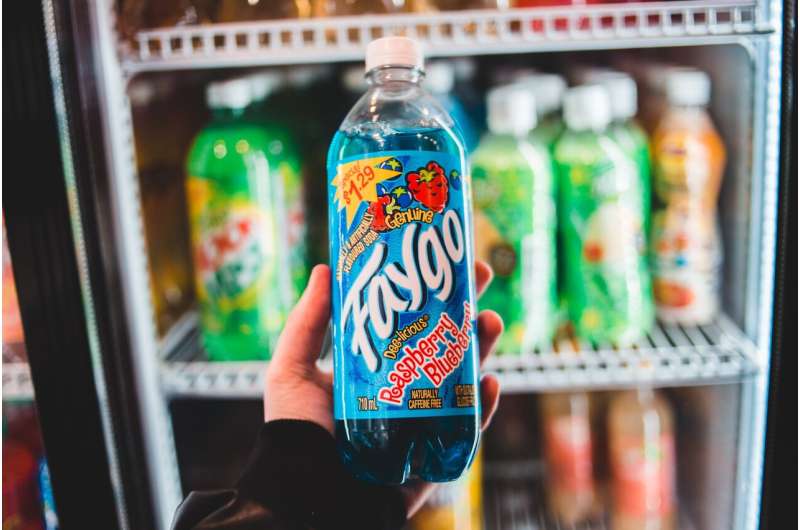Credit: Unsplash/CC0 Public Domain
Many institutions—such as schools, hospitals, and workplaces—have reduced the availability of sugar-sweetened beverages to help fight health problems such as weight gain, diabetes and heart disease. But for some people a sales ban that takes the temptation out of the workplace may not be enough.
Sugary drinks account for 34 percent of added sugar in the American diet, and for people who feel cravings and compulsive drive for sweet drinks, strong interventions in addition to the workplace sales ban may be needed, according to new research published March 29 in the Annals of Behavioral Science.
In 2015, UC San Francisco banned the sale of sugary beverages, defined as sodas, sports and energy drinks, "fruit drinks" such fruit-flavored drinks that are not 100 percent fruit juice, and sweetened teas and coffees.
In the years since, an interdisciplinary team of researchers at UCSF has been studying ban's effect.
From the outset, the researchers knew that some people may need a stronger intervention, and they conducted a 'multi-level' intervention by adding an individual motivational session on top of the environmental change.
Before the sales ban began, participants reported their sugary drink consumption and their why they drink it—whether it is in response to stress, because of the enjoyable taste, or because of strong cravings.
Half of a sample of UCSF employees were randomized to receive a 10-minute meeting with a trained health professional, who provided a brief counseling intervention and some follow-up phone calls to discuss obstacles. The session included education about sugary drinks and the impact of sugar on liver and disease risk, and goal setting to quit or cut down.
The researchers contacted participants six months later to reassess their consumption of the same type of drinks.
As reported in JAMA Internal Medicine, the sales ban reduced consumption across the sample by 45 percent, and the sample also showed reductions in abdominal adiposity. However, participants who reported drinking sugary drinks due to strong cravings did not benefit from the sales ban alone. But if they also received the brief intervention, they reduced their consumption by around 19 ounces per day. Reportedly drinking due to stress or enjoyment were not associated with outcomes in this study.
"This is striking," said Ashley Mason, Ph.D., the lead author, assistant professor in the Department of Psychiatry and Behavioral Science and a member of the UCSF Weill Institute for Neurosciences. "If we are able to identify who might benefit from an intervention as brief and simple as this one, we could meaningfully reduce the amount of sugar that heavy drinkers actually consume."
Elissa Epel, professor in the Department of Psychiatry and Behavioral Science, the senior author, has been studying the effects of compulsive and emotional eating on metabolic health.
"The ability to influence metabolic health through an institution-wide sales ban alone is very exciting. However, we know that one size does not fit all, and for many, sugary drinks have become a compulsive habit that is hard to break," said Epel, a member of the UCSF Weill Institute for Neurosciences. "But with a light touch motivational intervention, many changed their daily habits. Any reduction in sugar-sweetened beverages is meaningful, and for this high-risk group, they reported large reductions."
Robert Lustig, emeritus professor of Pediatrics and study physician, remarked: "SSBs have two addictive substances in them: sugar and caffeine. But sugar is worse, because of its detriments to metabolic health, and because it is hidden in processed foods without our knowledge. We know how difficult it is to break sugar addiction, but this study shows that with both personal and societal intervention working together, it is nonetheless achievable."
Laura Schmidt—the study co-PI, UCSF professor of Health Policy and an expert in food policy interventions—noted: "The next step is to disentangle the effects of the brief counseling intervention and the sales ban, and their synergy, particularly for people with strong sugar cravings. For those trying to quit, a supportive intervention alone might not be enough, but rather, using a sales ban to take the temptation out of the workplace could be very helpful."
More information: Ashley E Mason et al. A Brief Motivational Intervention Differentially Reduces Sugar-sweetened Beverage (SSB) Consumption, Annals of Behavioral Medicine (2021). DOI: 10.1093/abm/kaaa123
Journal information: Annals of Behavioral Medicine , JAMA Internal Medicine
Provided by University of California, San Francisco























